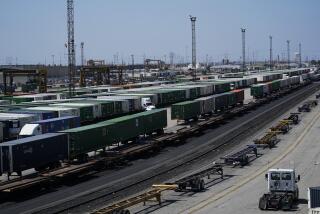Spreading Smog--and Doubt
The governors of the South Coast Air Quality Management District should adopt their own long-range plan for cleaner air over Southern California the instant it is legal to do so.
In the meantime, business leaders who have spent years and more money than it was worth trying to discredit the agency’s approach and build support for their own weaker plans should call off their massive lobbying effort.
Nothing in their campaign is scientifically new. Arguments that the district plan will damage the economy are as old as the attacks on the very first piece of smog-control equipment and, as a single glance around booming Southern California shows, as disreputable as they were 20 years ago.
The focus of the lobbying effort recently has been for a delay in approval of the plan. The vote was originally scheduled for Friday. Bureaucratic ineptitude, which involved failing to leave a minimum legal amount of time for public comment on the proposal, accomplished what the business leaders could not. But that should be the end of delays. Not only is the health of Southern Californians at stake, but time can erode support for the plan simply by giving its opponents further opportunity to spread doubt.
Southern California Edison Co. and its allies in the battle for some other plan may not be directly responsible for every single rumor of huge job losses, images of major industries packing up to leave and every false picture of the plan as a social and economic straitjacket for the region. But the rumors and fears are clearly rooted in arguments that Edison makes against the smog agency’s plan.
The plan is very complicated. Most people shrink instinctively from change and the unknown even on a small scale; the clean-air master plan is on a grand scale. And Southern California has no choice but to clean up its air. In that case, good corporate citizenship demands more than an effort to keep stockholders happy; it demands full support for ventures that benefit all Southern Californians.
The motives of Edison and the Western Oil and Gas Assn., which is promoting yet a third plan, are plain. Among them, refineries and utility companies would pay about half the cost of emission controls in the first phase of the smog district’s new plan. The emissions are largely soot and oxides of nitrogen that are created when fossil fuel is burned, as in the boiler of a power plant.
Not surprisingly, their alternatives call for relatively loose controls on soot and nitrogen oxides, with tighter controls on sources of the other major ingredient of smog, hydrocarbons and other organic gases that come from such places as automobile exhausts and dry-cleaning plants.
The plan does include such heroic measures as shifting many automobiles to methanol as a fuel, changing Southern California’s commuting habits in the direction of ride-sharing, and eventually trying to persuade people to arrange their lives so that they live closer to where they work.
But as Jane Hall, an economist at Cal State Fullerton, told the board of governors on Friday, the Congressional Budget Office in Washington recently concluded that the notion that smog controls damage the economy “is simply wrong.”
Of claims that Southern California would lose thousands of jobs, Hall said that, as nearly as computers can come to telling such things, the economy would behave this way: Instead of its economy growing 140% between now and the year 2010 without the new plan in effect, it would grow 138% with the plan--a lag that she said would be made up in the first half of 2011.
Edison has chosen not to make its alternative plan public, so it is difficult for the press to have its own analyses made of the idea. We have to take the word of analysts from, for example, the Environmental Protection Agency, the ultimate arbiter of the Clean Air Act, which calls the Edison study “technically deficient” and says that it would disapprove any plan based on Edison’s approach. Partly for that reason, the district’s plan has the bipartisan support of California’s senators, Democrat Alan Cranston and Republican Pete Wilson.
Edison is entitled to keep trying to sell its plan to the experts or to modify it in ways that might make at least some of its ideas useful. It can do that almost indefinitely because the plan that the smog board should adopt by mid-March will never really be final; some things may not work at all, and some may work better than anyone now imagines. Every page will be under constant review.
But Edison must call off the apostles of in- decision on clean air. It should support the smog agency’s plan, work for change in that framework and encourage its allies to do the same.
More to Read
Sign up for Essential California
The most important California stories and recommendations in your inbox every morning.
You may occasionally receive promotional content from the Los Angeles Times.










